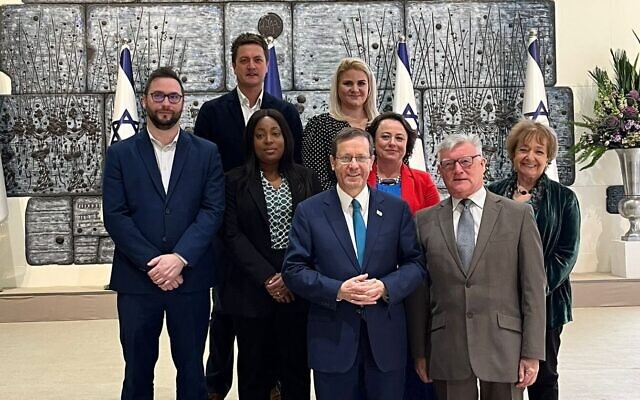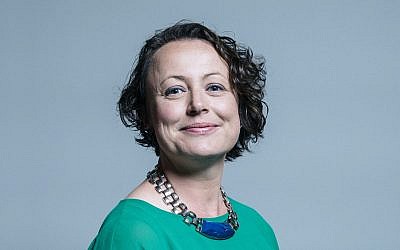OPINION: Threats to the most precious aspect of Israel’s character
Labour Friends of Israel vice-chair Catherine McKinnell reflects on last week's delegation to Israel and the Palestinian territories

Last week, I travelled to Israel for the first time as part of a delegation organised by Labour Friends of Israel.
As we heard repeatedly, our trip comes at a time when the state faces both immense challenges and huge opportunities.
There is perhaps no more powerful reminder of the reason why so many see the importance of the State of Israel than standing in the Hall of Names at Yad Vashem which bleakly recalls the scale of the tragedy which befell Jewish people at the hands of the Nazis 80 years ago.
Today, Israel remains the ultimate safe haven for Jewish people throughout the world, as well as fulfilling their historic demand for self-determination.

As we travelled around Israel, we were constantly reminded of the scale of the country’s achievements over the past eight decades: a robust democracy, vibrant civic society, a strong welfare state, and a thriving economy.
Some of those achievements are now under challenge like never before by the new government which is seeking to divide people and undermine democratic norms by rushing through dangerous and ill-conceived judicial reforms. Israel, sadly is not immune from the rise of far-Right populism which we have witnessed in other western democracies in recent years including the US, France, Sweden and Italy.
The divisions within society which the right is seeking to deepen and exploit – between Arabs and Jews and secular and ultra-religious Israelis – were frequently a feature of our discussions.
They are particularly dangerous given the security situation: the rise in terrorism over the past year – seen in the terrible events in Jerusalem in recent weeks – and the constant threat posed by Hamas, Hezbollah and their paymasters in Iran. We saw this first-hand close to the Gaza border at Kibbutz Kfar Aza, whose residents live under the constant shadow of rocket attack.
At the same time, the lack of progress in the peace process – which has been stalled for the best part of a decade – is preventing movement towards a two-state solution.
The divisions within society which the right is seeking to deepen and exploit – between Arabs and Jews and secular and ultra-religious Israelis – were frequently a feature of our discussions.
This threatens the most precious aspect of Israel’s character: that it is a Jewish and democratic state.
As our meetings with civil society organisations and the Palestinian Authority in Ramallah underlined, it also increases the sense of despair and hopelessness among the Palestinian people and weakens the position of those leaders who reject violence and terrorism in favour of negotiation and compromise.
But I was also stuck by the fact that, amid the difficulties and challenges, there remain grounds for optimism.
Meeting (Israeli president) Isaac Herzog, we were reminded of the strength of Israel’s democratic institutions and that principled individuals – epitomised by the president himself – are determined to defend them. Indeed, our discussions with Merav Michaeli and our friends in the Israeli Labor party showed the Netanyahu government has a real fight on its hands.
Indeed, as political leaders in Israel and Palestine have failed to show courage to further the cause of peace over the past decade, civic society has begun to fill the void.
As we learned from groups such as Tech2Peace, EcoPeace and visiting the Peres Centre for Peace and Innovation, programmes which bring together Israeli and Palestinians, Jews and Arabs, and Israelis and their regional neighbours are working to foster mutual understanding and trust and peace-building and conflict-resolution values upon which any future political settlement will ultimately have to rest.
And – as the Abraham Accords are proving – once unthinkable ties are being forged which can harness Israel’s strengths in innovation and tech to help meet regional challenges, including climate change, water scarcity and energy insecurity.
Ultimately, our trip reinforced my belief that the complexities and nuances of Israel’s domestic challenges and the conflict with the Palestinians are best understood and appreciated by seeing the situation on the ground first hand – and above all, by speaking to Israelis and Palestinians themselves about their reality today and their hopes for the future.
- Catherine McKinnell is Labour MP for Newcastle North

Thank you for helping to make Jewish News the leading source of news and opinion for the UK Jewish community. Today we're asking for your invaluable help to continue putting our community first in everything we do.
For as little as £5 a month you can help sustain the vital work we do in celebrating and standing up for Jewish life in Britain.
Jewish News holds our community together and keeps us connected. Like a synagogue, it’s where people turn to feel part of something bigger. It also proudly shows the rest of Britain the vibrancy and rich culture of modern Jewish life.
You can make a quick and easy one-off or monthly contribution of £5, £10, £20 or any other sum you’re comfortable with.
100% of your donation will help us continue celebrating our community, in all its dynamic diversity...
Engaging
Being a community platform means so much more than producing a newspaper and website. One of our proudest roles is media partnering with our invaluable charities to amplify the outstanding work they do to help us all.
Celebrating
There’s no shortage of oys in the world but Jewish News takes every opportunity to celebrate the joys too, through projects like Night of Heroes, 40 Under 40 and other compelling countdowns that make the community kvell with pride.
Pioneering
In the first collaboration between media outlets from different faiths, Jewish News worked with British Muslim TV and Church Times to produce a list of young activists leading the way on interfaith understanding.
Campaigning
Royal Mail issued a stamp honouring Holocaust hero Sir Nicholas Winton after a Jewish News campaign attracted more than 100,000 backers. Jewish Newsalso produces special editions of the paper highlighting pressing issues including mental health and Holocaust remembrance.
Easy access
In an age when news is readily accessible, Jewish News provides high-quality content free online and offline, removing any financial barriers to connecting people.
Voice of our community to wider society
The Jewish News team regularly appears on TV, radio and on the pages of the national press to comment on stories about the Jewish community. Easy access to the paper on the streets of London also means Jewish News provides an invaluable window into the community for the country at large.
We hope you agree all this is worth preserving.





















